Evaluating Candidates: Is Social Media Analysis Ethical?
VerifiedAdded on 2023/01/12
|7
|2002
|34
Essay
AI Summary
This essay delves into the ethical debate surrounding the use of social media in hiring practices. It explores the arguments for and against companies analyzing candidates' social media profiles. The essay presents the benefits of using social media in recruitment, such as gaining information about candidates' backgrounds, behaviors, and skills, as well as cost and time effectiveness. However, it also highlights the ethical concerns, including the potential for illegal and unethical practices, the lack of guaranteed results, the increased risk of bias and discrimination, and technological disadvantages such as privacy and security. The conclusion emphasizes that while social media screening has become attractive for recruiters, it poses threats of being unethical and the information available on social media cannot be contextualized for the job role.
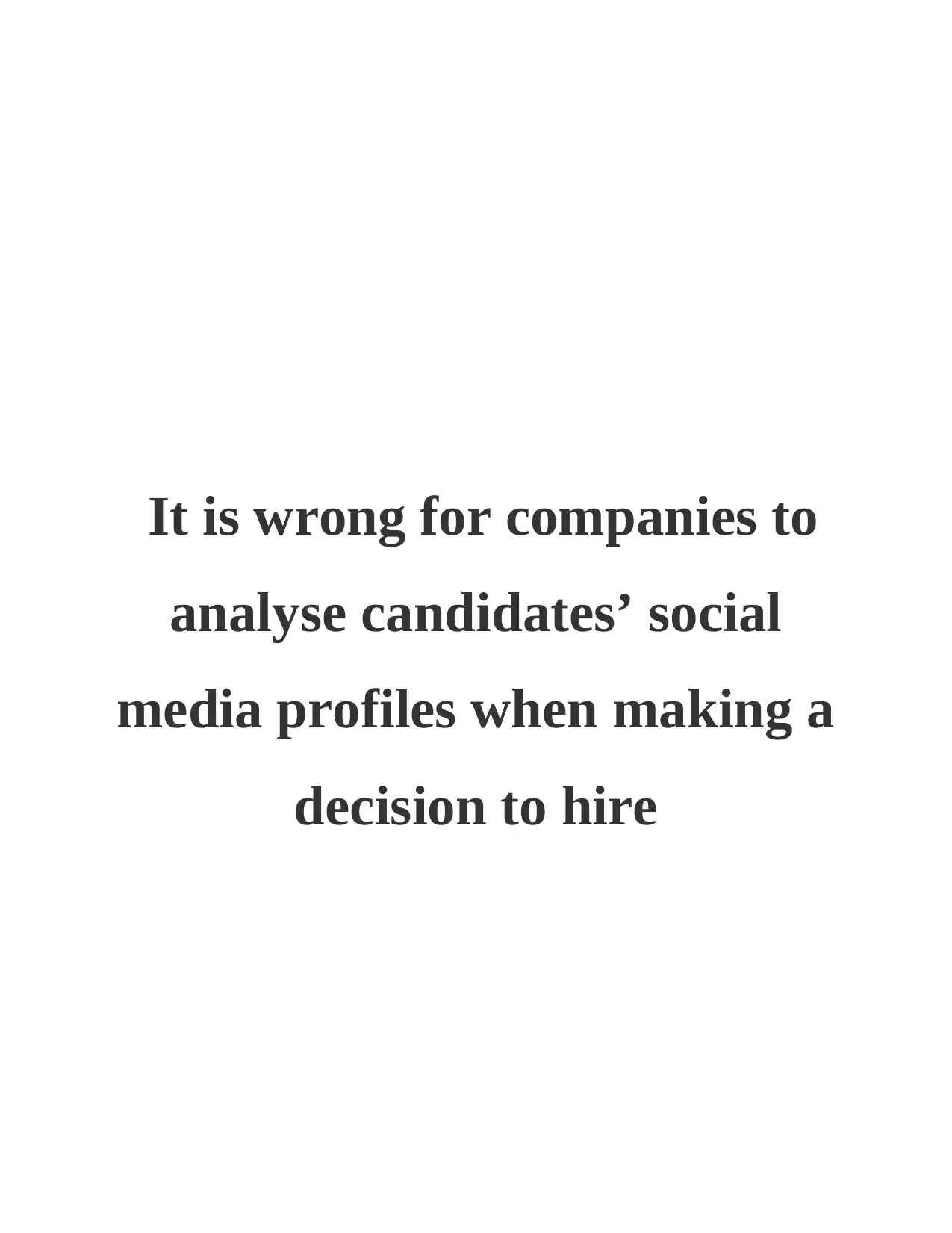
It is wrong for companies to
analyse candidates’ social
media profiles when making a
decision to hire
analyse candidates’ social
media profiles when making a
decision to hire
Paraphrase This Document
Need a fresh take? Get an instant paraphrase of this document with our AI Paraphraser
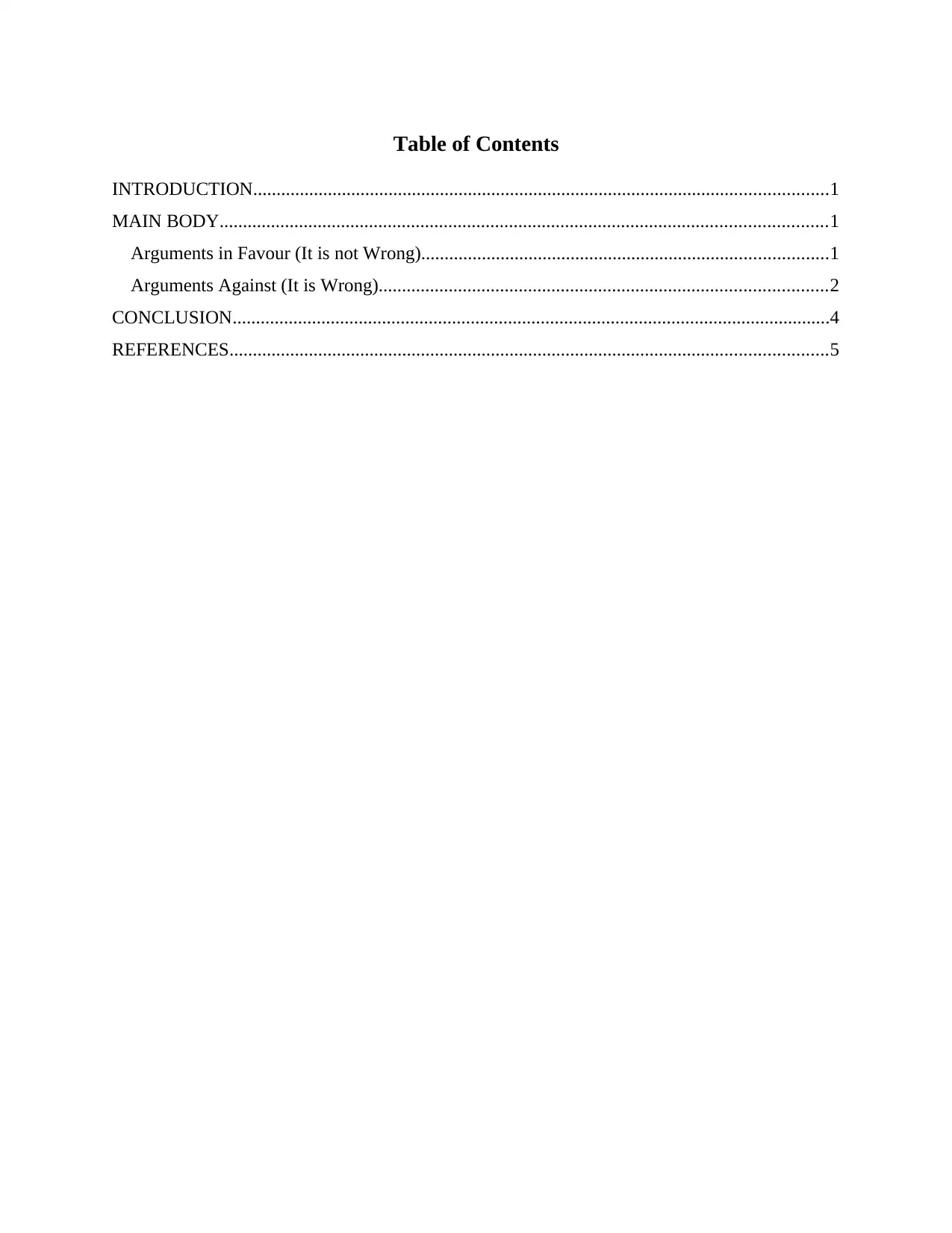
Table of Contents
INTRODUCTION...........................................................................................................................1
MAIN BODY..................................................................................................................................1
Arguments in Favour (It is not Wrong).......................................................................................1
Arguments Against (It is Wrong)................................................................................................2
CONCLUSION................................................................................................................................4
REFERENCES................................................................................................................................5
INTRODUCTION...........................................................................................................................1
MAIN BODY..................................................................................................................................1
Arguments in Favour (It is not Wrong).......................................................................................1
Arguments Against (It is Wrong)................................................................................................2
CONCLUSION................................................................................................................................4
REFERENCES................................................................................................................................5
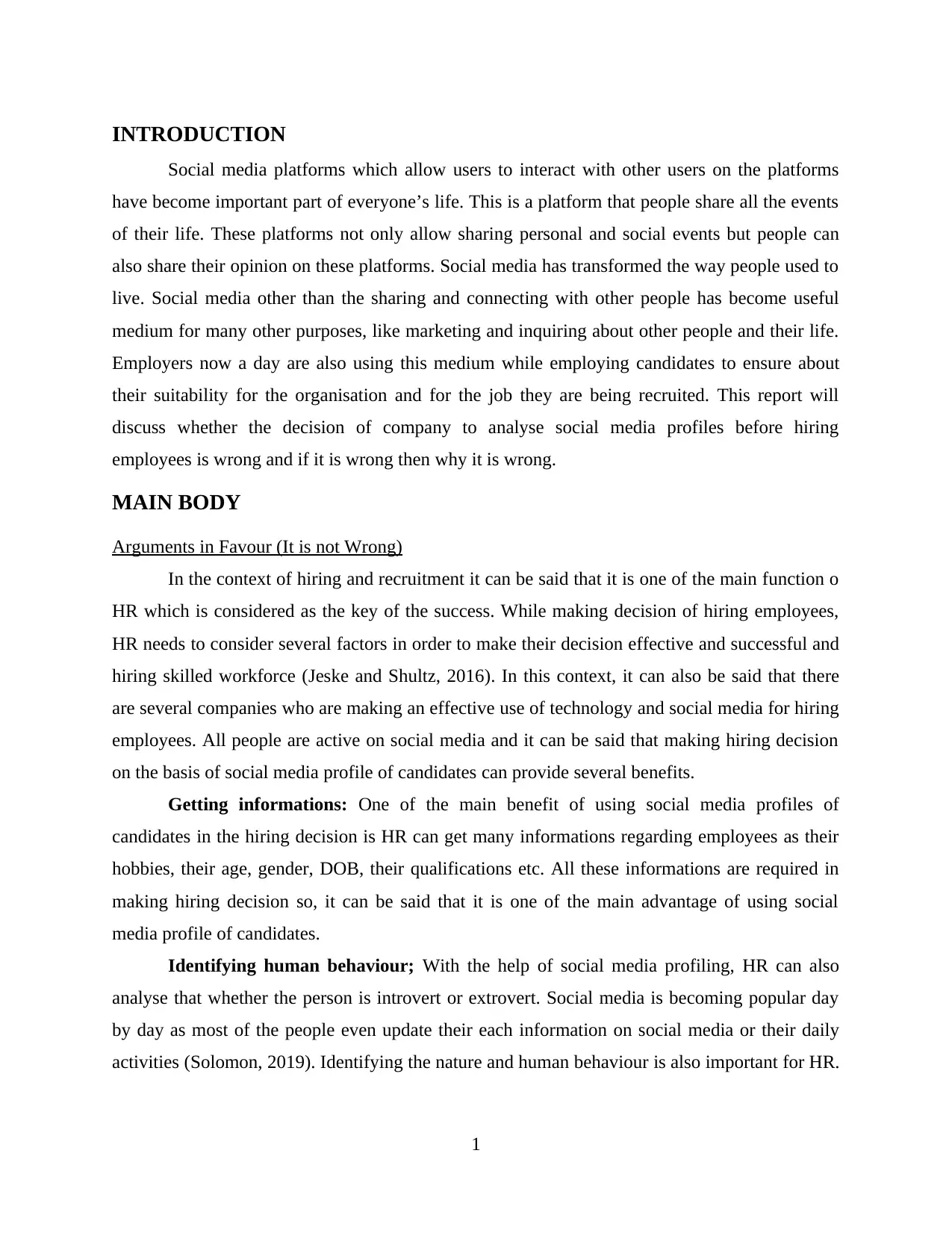
INTRODUCTION
Social media platforms which allow users to interact with other users on the platforms
have become important part of everyone’s life. This is a platform that people share all the events
of their life. These platforms not only allow sharing personal and social events but people can
also share their opinion on these platforms. Social media has transformed the way people used to
live. Social media other than the sharing and connecting with other people has become useful
medium for many other purposes, like marketing and inquiring about other people and their life.
Employers now a day are also using this medium while employing candidates to ensure about
their suitability for the organisation and for the job they are being recruited. This report will
discuss whether the decision of company to analyse social media profiles before hiring
employees is wrong and if it is wrong then why it is wrong.
MAIN BODY
Arguments in Favour (It is not Wrong)
In the context of hiring and recruitment it can be said that it is one of the main function o
HR which is considered as the key of the success. While making decision of hiring employees,
HR needs to consider several factors in order to make their decision effective and successful and
hiring skilled workforce (Jeske and Shultz, 2016). In this context, it can also be said that there
are several companies who are making an effective use of technology and social media for hiring
employees. All people are active on social media and it can be said that making hiring decision
on the basis of social media profile of candidates can provide several benefits.
Getting informations: One of the main benefit of using social media profiles of
candidates in the hiring decision is HR can get many informations regarding employees as their
hobbies, their age, gender, DOB, their qualifications etc. All these informations are required in
making hiring decision so, it can be said that it is one of the main advantage of using social
media profile of candidates.
Identifying human behaviour; With the help of social media profiling, HR can also
analyse that whether the person is introvert or extrovert. Social media is becoming popular day
by day as most of the people even update their each information on social media or their daily
activities (Solomon, 2019). Identifying the nature and human behaviour is also important for HR.
1
Social media platforms which allow users to interact with other users on the platforms
have become important part of everyone’s life. This is a platform that people share all the events
of their life. These platforms not only allow sharing personal and social events but people can
also share their opinion on these platforms. Social media has transformed the way people used to
live. Social media other than the sharing and connecting with other people has become useful
medium for many other purposes, like marketing and inquiring about other people and their life.
Employers now a day are also using this medium while employing candidates to ensure about
their suitability for the organisation and for the job they are being recruited. This report will
discuss whether the decision of company to analyse social media profiles before hiring
employees is wrong and if it is wrong then why it is wrong.
MAIN BODY
Arguments in Favour (It is not Wrong)
In the context of hiring and recruitment it can be said that it is one of the main function o
HR which is considered as the key of the success. While making decision of hiring employees,
HR needs to consider several factors in order to make their decision effective and successful and
hiring skilled workforce (Jeske and Shultz, 2016). In this context, it can also be said that there
are several companies who are making an effective use of technology and social media for hiring
employees. All people are active on social media and it can be said that making hiring decision
on the basis of social media profile of candidates can provide several benefits.
Getting informations: One of the main benefit of using social media profiles of
candidates in the hiring decision is HR can get many informations regarding employees as their
hobbies, their age, gender, DOB, their qualifications etc. All these informations are required in
making hiring decision so, it can be said that it is one of the main advantage of using social
media profile of candidates.
Identifying human behaviour; With the help of social media profiling, HR can also
analyse that whether the person is introvert or extrovert. Social media is becoming popular day
by day as most of the people even update their each information on social media or their daily
activities (Solomon, 2019). Identifying the nature and human behaviour is also important for HR.
1
⊘ This is a preview!⊘
Do you want full access?
Subscribe today to unlock all pages.

Trusted by 1+ million students worldwide
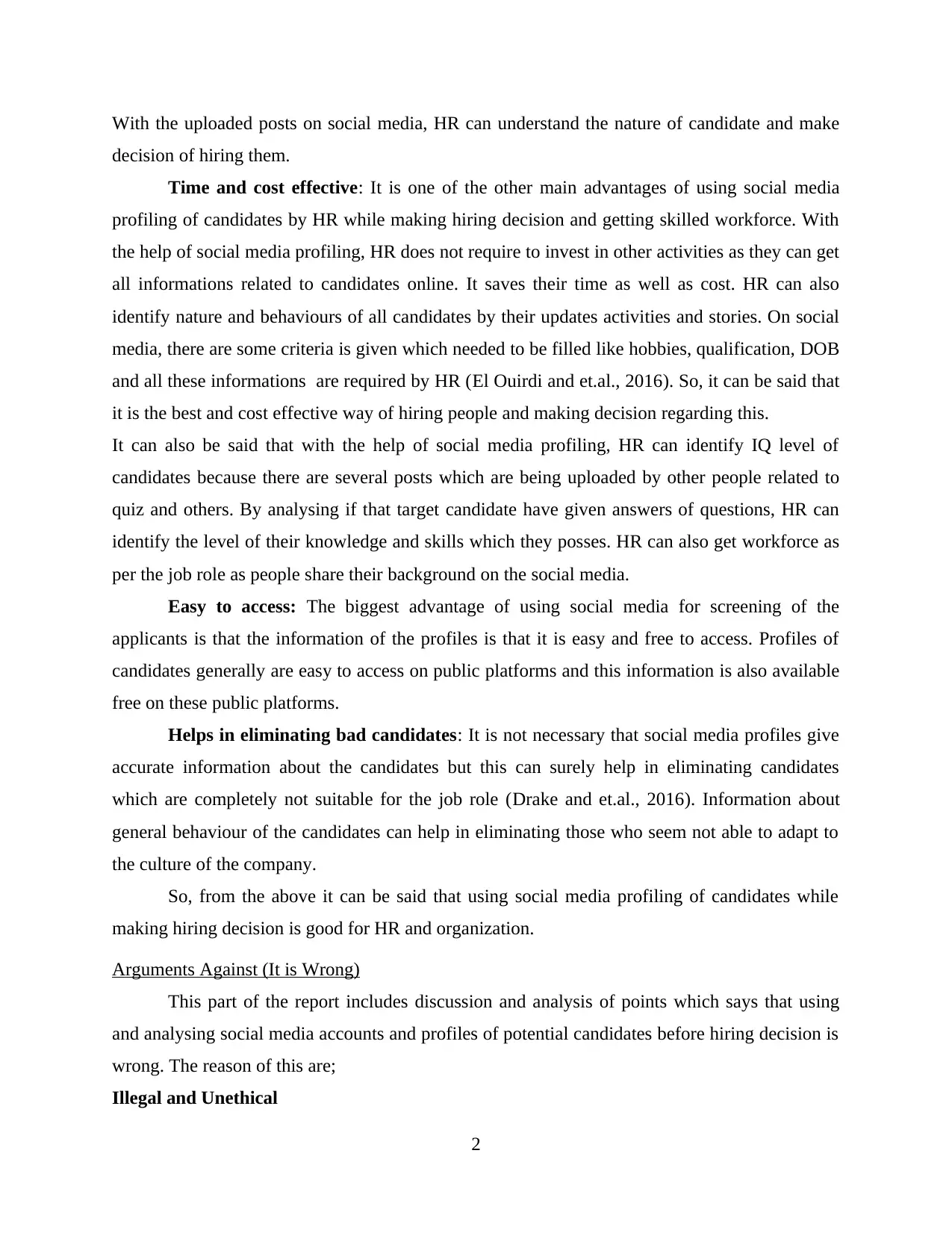
With the uploaded posts on social media, HR can understand the nature of candidate and make
decision of hiring them.
Time and cost effective: It is one of the other main advantages of using social media
profiling of candidates by HR while making hiring decision and getting skilled workforce. With
the help of social media profiling, HR does not require to invest in other activities as they can get
all informations related to candidates online. It saves their time as well as cost. HR can also
identify nature and behaviours of all candidates by their updates activities and stories. On social
media, there are some criteria is given which needed to be filled like hobbies, qualification, DOB
and all these informations are required by HR (El Ouirdi and et.al., 2016). So, it can be said that
it is the best and cost effective way of hiring people and making decision regarding this.
It can also be said that with the help of social media profiling, HR can identify IQ level of
candidates because there are several posts which are being uploaded by other people related to
quiz and others. By analysing if that target candidate have given answers of questions, HR can
identify the level of their knowledge and skills which they posses. HR can also get workforce as
per the job role as people share their background on the social media.
Easy to access: The biggest advantage of using social media for screening of the
applicants is that the information of the profiles is that it is easy and free to access. Profiles of
candidates generally are easy to access on public platforms and this information is also available
free on these public platforms.
Helps in eliminating bad candidates: It is not necessary that social media profiles give
accurate information about the candidates but this can surely help in eliminating candidates
which are completely not suitable for the job role (Drake and et.al., 2016). Information about
general behaviour of the candidates can help in eliminating those who seem not able to adapt to
the culture of the company.
So, from the above it can be said that using social media profiling of candidates while
making hiring decision is good for HR and organization.
Arguments Against (It is Wrong)
This part of the report includes discussion and analysis of points which says that using
and analysing social media accounts and profiles of potential candidates before hiring decision is
wrong. The reason of this are;
Illegal and Unethical
2
decision of hiring them.
Time and cost effective: It is one of the other main advantages of using social media
profiling of candidates by HR while making hiring decision and getting skilled workforce. With
the help of social media profiling, HR does not require to invest in other activities as they can get
all informations related to candidates online. It saves their time as well as cost. HR can also
identify nature and behaviours of all candidates by their updates activities and stories. On social
media, there are some criteria is given which needed to be filled like hobbies, qualification, DOB
and all these informations are required by HR (El Ouirdi and et.al., 2016). So, it can be said that
it is the best and cost effective way of hiring people and making decision regarding this.
It can also be said that with the help of social media profiling, HR can identify IQ level of
candidates because there are several posts which are being uploaded by other people related to
quiz and others. By analysing if that target candidate have given answers of questions, HR can
identify the level of their knowledge and skills which they posses. HR can also get workforce as
per the job role as people share their background on the social media.
Easy to access: The biggest advantage of using social media for screening of the
applicants is that the information of the profiles is that it is easy and free to access. Profiles of
candidates generally are easy to access on public platforms and this information is also available
free on these public platforms.
Helps in eliminating bad candidates: It is not necessary that social media profiles give
accurate information about the candidates but this can surely help in eliminating candidates
which are completely not suitable for the job role (Drake and et.al., 2016). Information about
general behaviour of the candidates can help in eliminating those who seem not able to adapt to
the culture of the company.
So, from the above it can be said that using social media profiling of candidates while
making hiring decision is good for HR and organization.
Arguments Against (It is Wrong)
This part of the report includes discussion and analysis of points which says that using
and analysing social media accounts and profiles of potential candidates before hiring decision is
wrong. The reason of this are;
Illegal and Unethical
2
Paraphrase This Document
Need a fresh take? Get an instant paraphrase of this document with our AI Paraphraser
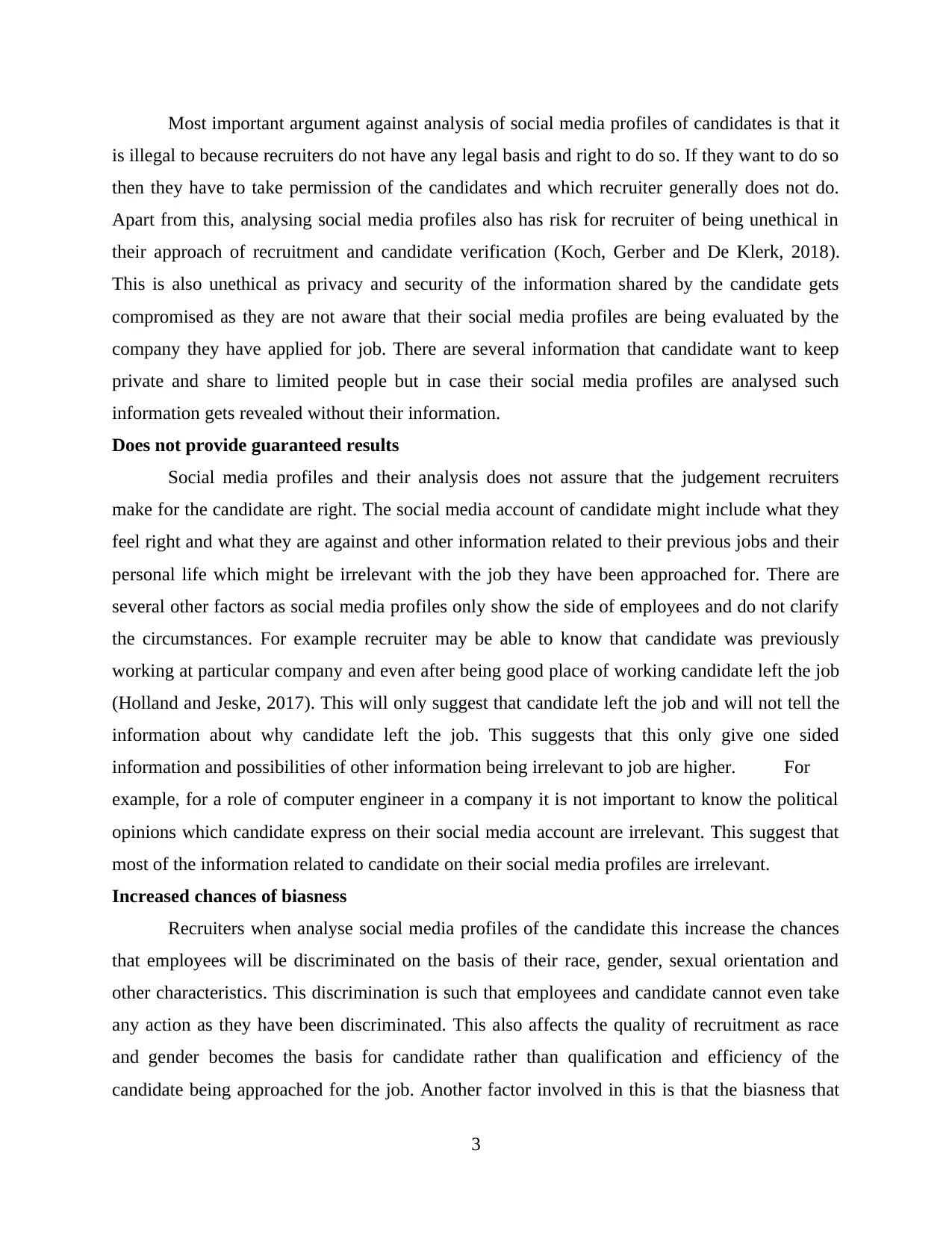
Most important argument against analysis of social media profiles of candidates is that it
is illegal to because recruiters do not have any legal basis and right to do so. If they want to do so
then they have to take permission of the candidates and which recruiter generally does not do.
Apart from this, analysing social media profiles also has risk for recruiter of being unethical in
their approach of recruitment and candidate verification (Koch, Gerber and De Klerk, 2018).
This is also unethical as privacy and security of the information shared by the candidate gets
compromised as they are not aware that their social media profiles are being evaluated by the
company they have applied for job. There are several information that candidate want to keep
private and share to limited people but in case their social media profiles are analysed such
information gets revealed without their information.
Does not provide guaranteed results
Social media profiles and their analysis does not assure that the judgement recruiters
make for the candidate are right. The social media account of candidate might include what they
feel right and what they are against and other information related to their previous jobs and their
personal life which might be irrelevant with the job they have been approached for. There are
several other factors as social media profiles only show the side of employees and do not clarify
the circumstances. For example recruiter may be able to know that candidate was previously
working at particular company and even after being good place of working candidate left the job
(Holland and Jeske, 2017). This will only suggest that candidate left the job and will not tell the
information about why candidate left the job. This suggests that this only give one sided
information and possibilities of other information being irrelevant to job are higher. For
example, for a role of computer engineer in a company it is not important to know the political
opinions which candidate express on their social media account are irrelevant. This suggest that
most of the information related to candidate on their social media profiles are irrelevant.
Increased chances of biasness
Recruiters when analyse social media profiles of the candidate this increase the chances
that employees will be discriminated on the basis of their race, gender, sexual orientation and
other characteristics. This discrimination is such that employees and candidate cannot even take
any action as they have been discriminated. This also affects the quality of recruitment as race
and gender becomes the basis for candidate rather than qualification and efficiency of the
candidate being approached for the job. Another factor involved in this is that the biasness that
3
is illegal to because recruiters do not have any legal basis and right to do so. If they want to do so
then they have to take permission of the candidates and which recruiter generally does not do.
Apart from this, analysing social media profiles also has risk for recruiter of being unethical in
their approach of recruitment and candidate verification (Koch, Gerber and De Klerk, 2018).
This is also unethical as privacy and security of the information shared by the candidate gets
compromised as they are not aware that their social media profiles are being evaluated by the
company they have applied for job. There are several information that candidate want to keep
private and share to limited people but in case their social media profiles are analysed such
information gets revealed without their information.
Does not provide guaranteed results
Social media profiles and their analysis does not assure that the judgement recruiters
make for the candidate are right. The social media account of candidate might include what they
feel right and what they are against and other information related to their previous jobs and their
personal life which might be irrelevant with the job they have been approached for. There are
several other factors as social media profiles only show the side of employees and do not clarify
the circumstances. For example recruiter may be able to know that candidate was previously
working at particular company and even after being good place of working candidate left the job
(Holland and Jeske, 2017). This will only suggest that candidate left the job and will not tell the
information about why candidate left the job. This suggests that this only give one sided
information and possibilities of other information being irrelevant to job are higher. For
example, for a role of computer engineer in a company it is not important to know the political
opinions which candidate express on their social media account are irrelevant. This suggest that
most of the information related to candidate on their social media profiles are irrelevant.
Increased chances of biasness
Recruiters when analyse social media profiles of the candidate this increase the chances
that employees will be discriminated on the basis of their race, gender, sexual orientation and
other characteristics. This discrimination is such that employees and candidate cannot even take
any action as they have been discriminated. This also affects the quality of recruitment as race
and gender becomes the basis for candidate rather than qualification and efficiency of the
candidate being approached for the job. Another factor involved in this is that the biasness that
3
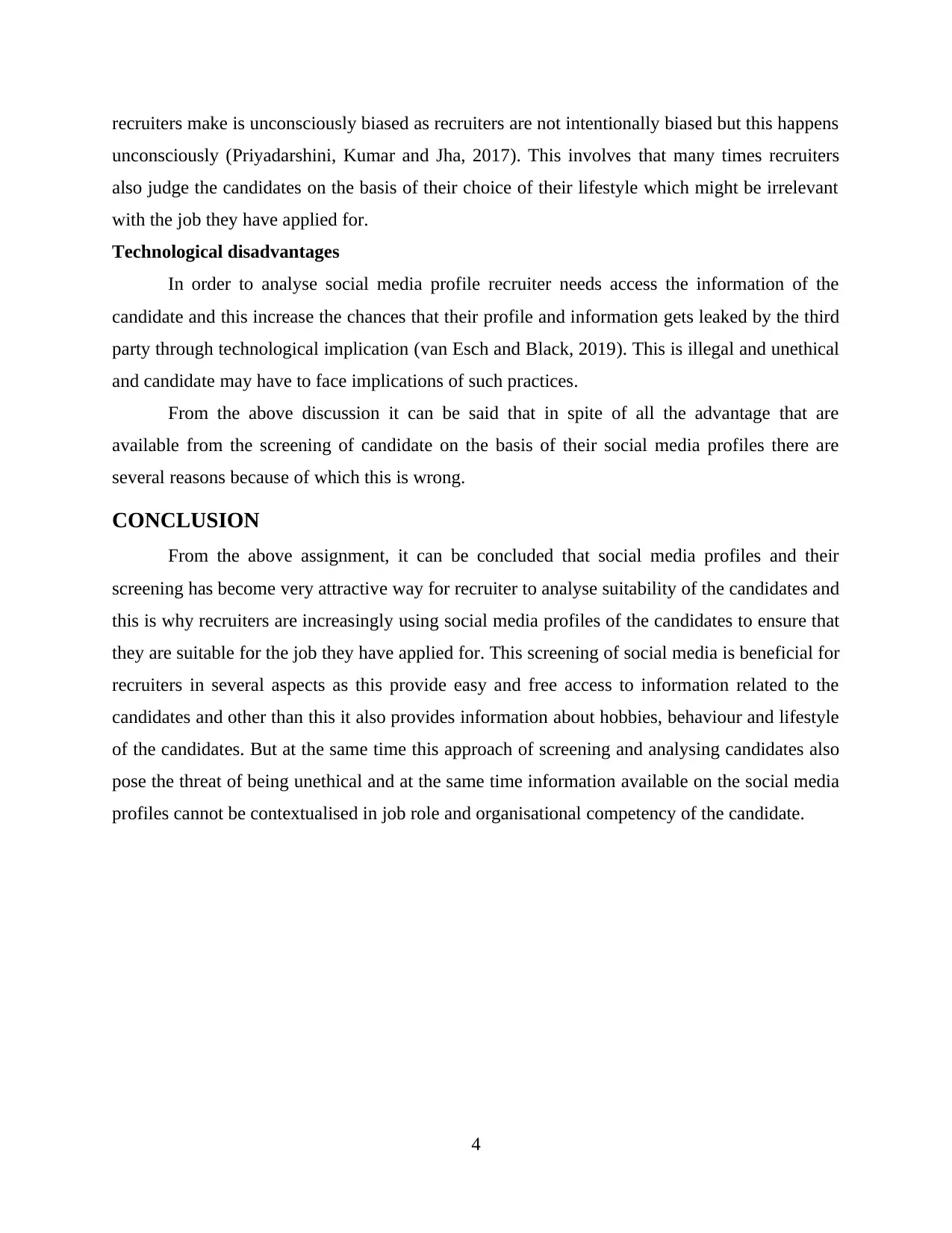
recruiters make is unconsciously biased as recruiters are not intentionally biased but this happens
unconsciously (Priyadarshini, Kumar and Jha, 2017). This involves that many times recruiters
also judge the candidates on the basis of their choice of their lifestyle which might be irrelevant
with the job they have applied for.
Technological disadvantages
In order to analyse social media profile recruiter needs access the information of the
candidate and this increase the chances that their profile and information gets leaked by the third
party through technological implication (van Esch and Black, 2019). This is illegal and unethical
and candidate may have to face implications of such practices.
From the above discussion it can be said that in spite of all the advantage that are
available from the screening of candidate on the basis of their social media profiles there are
several reasons because of which this is wrong.
CONCLUSION
From the above assignment, it can be concluded that social media profiles and their
screening has become very attractive way for recruiter to analyse suitability of the candidates and
this is why recruiters are increasingly using social media profiles of the candidates to ensure that
they are suitable for the job they have applied for. This screening of social media is beneficial for
recruiters in several aspects as this provide easy and free access to information related to the
candidates and other than this it also provides information about hobbies, behaviour and lifestyle
of the candidates. But at the same time this approach of screening and analysing candidates also
pose the threat of being unethical and at the same time information available on the social media
profiles cannot be contextualised in job role and organisational competency of the candidate.
4
unconsciously (Priyadarshini, Kumar and Jha, 2017). This involves that many times recruiters
also judge the candidates on the basis of their choice of their lifestyle which might be irrelevant
with the job they have applied for.
Technological disadvantages
In order to analyse social media profile recruiter needs access the information of the
candidate and this increase the chances that their profile and information gets leaked by the third
party through technological implication (van Esch and Black, 2019). This is illegal and unethical
and candidate may have to face implications of such practices.
From the above discussion it can be said that in spite of all the advantage that are
available from the screening of candidate on the basis of their social media profiles there are
several reasons because of which this is wrong.
CONCLUSION
From the above assignment, it can be concluded that social media profiles and their
screening has become very attractive way for recruiter to analyse suitability of the candidates and
this is why recruiters are increasingly using social media profiles of the candidates to ensure that
they are suitable for the job they have applied for. This screening of social media is beneficial for
recruiters in several aspects as this provide easy and free access to information related to the
candidates and other than this it also provides information about hobbies, behaviour and lifestyle
of the candidates. But at the same time this approach of screening and analysing candidates also
pose the threat of being unethical and at the same time information available on the social media
profiles cannot be contextualised in job role and organisational competency of the candidate.
4
⊘ This is a preview!⊘
Do you want full access?
Subscribe today to unlock all pages.

Trusted by 1+ million students worldwide
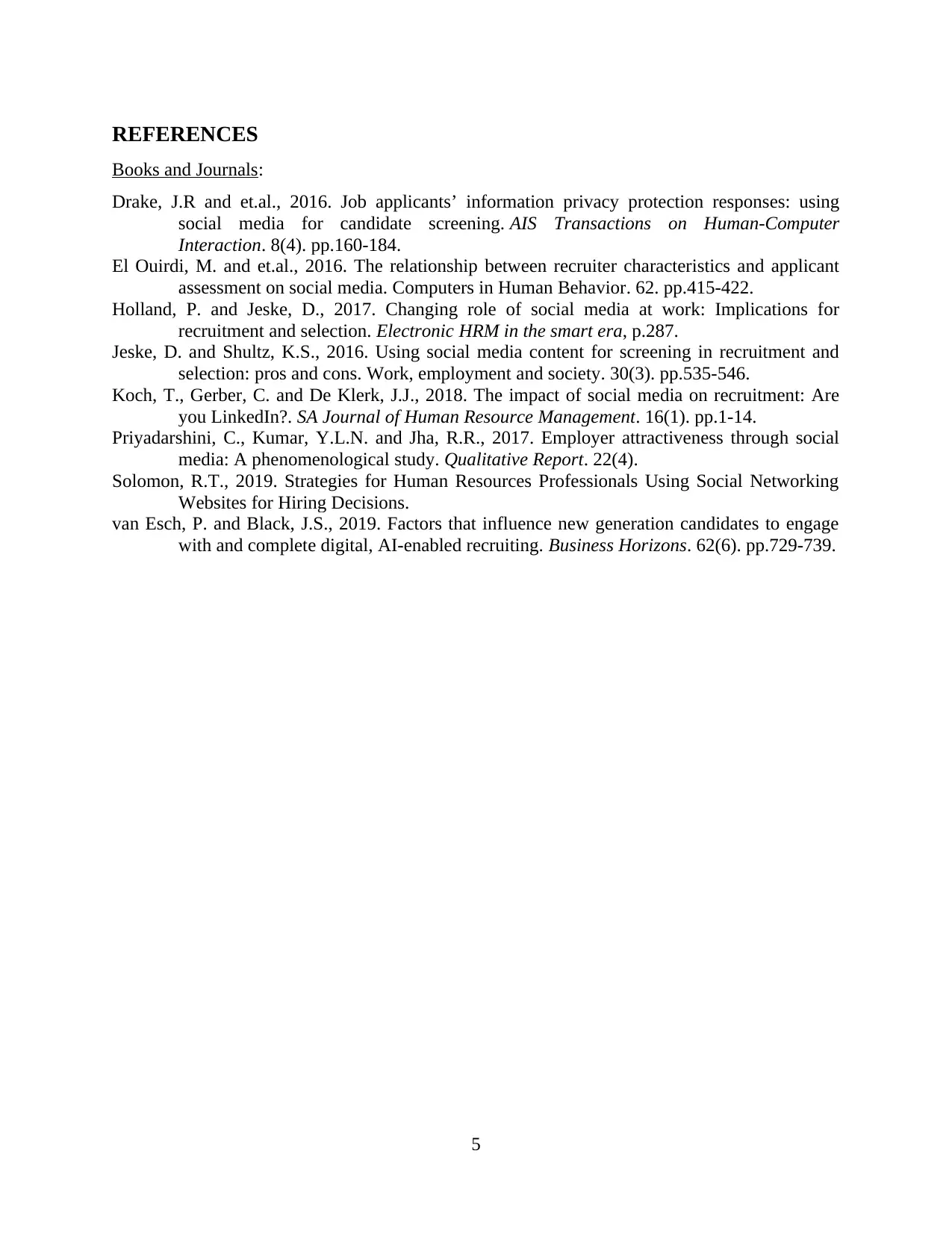
REFERENCES
Books and Journals:
Drake, J.R and et.al., 2016. Job applicants’ information privacy protection responses: using
social media for candidate screening. AIS Transactions on Human-Computer
Interaction. 8(4). pp.160-184.
El Ouirdi, M. and et.al., 2016. The relationship between recruiter characteristics and applicant
assessment on social media. Computers in Human Behavior. 62. pp.415-422.
Holland, P. and Jeske, D., 2017. Changing role of social media at work: Implications for
recruitment and selection. Electronic HRM in the smart era, p.287.
Jeske, D. and Shultz, K.S., 2016. Using social media content for screening in recruitment and
selection: pros and cons. Work, employment and society. 30(3). pp.535-546.
Koch, T., Gerber, C. and De Klerk, J.J., 2018. The impact of social media on recruitment: Are
you LinkedIn?. SA Journal of Human Resource Management. 16(1). pp.1-14.
Priyadarshini, C., Kumar, Y.L.N. and Jha, R.R., 2017. Employer attractiveness through social
media: A phenomenological study. Qualitative Report. 22(4).
Solomon, R.T., 2019. Strategies for Human Resources Professionals Using Social Networking
Websites for Hiring Decisions.
van Esch, P. and Black, J.S., 2019. Factors that influence new generation candidates to engage
with and complete digital, AI-enabled recruiting. Business Horizons. 62(6). pp.729-739.
5
Books and Journals:
Drake, J.R and et.al., 2016. Job applicants’ information privacy protection responses: using
social media for candidate screening. AIS Transactions on Human-Computer
Interaction. 8(4). pp.160-184.
El Ouirdi, M. and et.al., 2016. The relationship between recruiter characteristics and applicant
assessment on social media. Computers in Human Behavior. 62. pp.415-422.
Holland, P. and Jeske, D., 2017. Changing role of social media at work: Implications for
recruitment and selection. Electronic HRM in the smart era, p.287.
Jeske, D. and Shultz, K.S., 2016. Using social media content for screening in recruitment and
selection: pros and cons. Work, employment and society. 30(3). pp.535-546.
Koch, T., Gerber, C. and De Klerk, J.J., 2018. The impact of social media on recruitment: Are
you LinkedIn?. SA Journal of Human Resource Management. 16(1). pp.1-14.
Priyadarshini, C., Kumar, Y.L.N. and Jha, R.R., 2017. Employer attractiveness through social
media: A phenomenological study. Qualitative Report. 22(4).
Solomon, R.T., 2019. Strategies for Human Resources Professionals Using Social Networking
Websites for Hiring Decisions.
van Esch, P. and Black, J.S., 2019. Factors that influence new generation candidates to engage
with and complete digital, AI-enabled recruiting. Business Horizons. 62(6). pp.729-739.
5
1 out of 7
Related Documents
Your All-in-One AI-Powered Toolkit for Academic Success.
+13062052269
info@desklib.com
Available 24*7 on WhatsApp / Email
![[object Object]](/_next/static/media/star-bottom.7253800d.svg)
Unlock your academic potential
Copyright © 2020–2025 A2Z Services. All Rights Reserved. Developed and managed by ZUCOL.





